|
52 Anerley Road
Penge
https://whatpub.com/paxton-arms
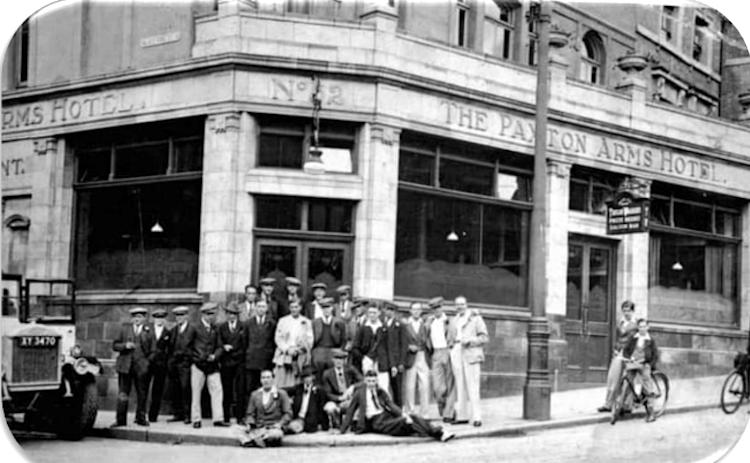
Above photo, circa 1940s.
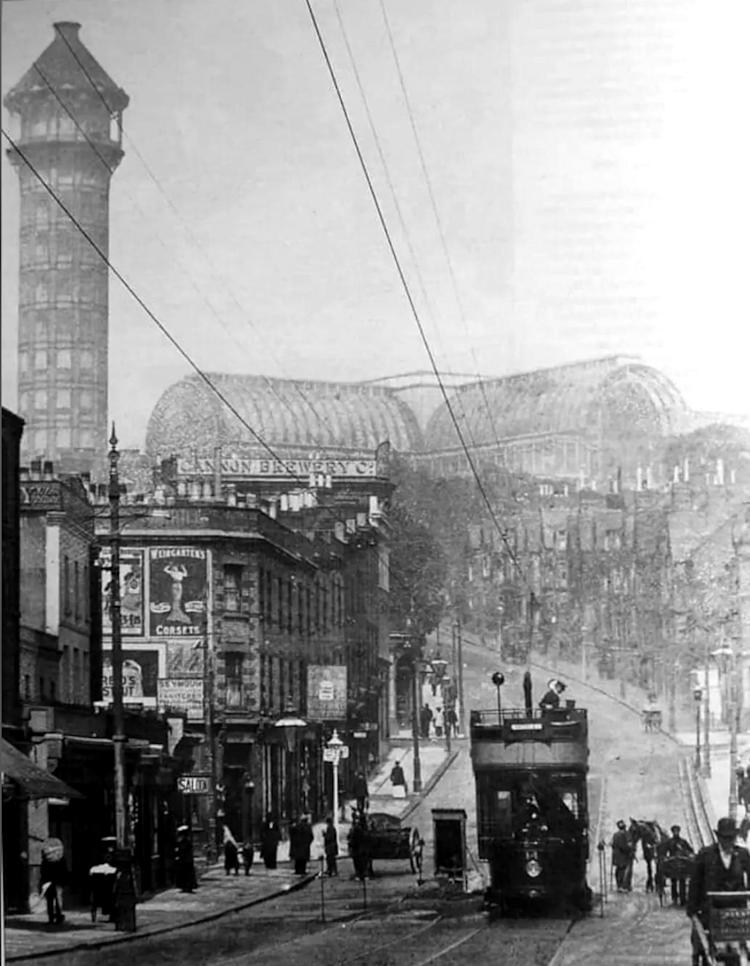
Above photo, date unknown, kindly sent by Kenneth Griffiths. |
|
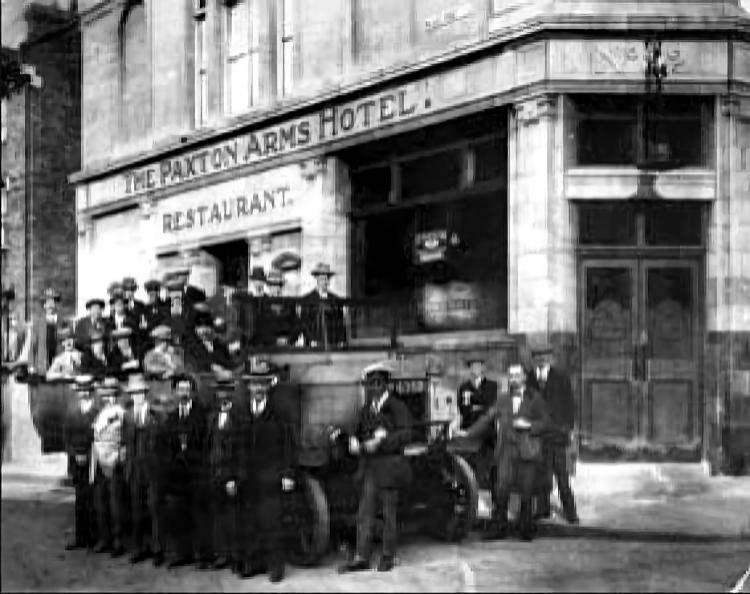
Above photo 1940s. |
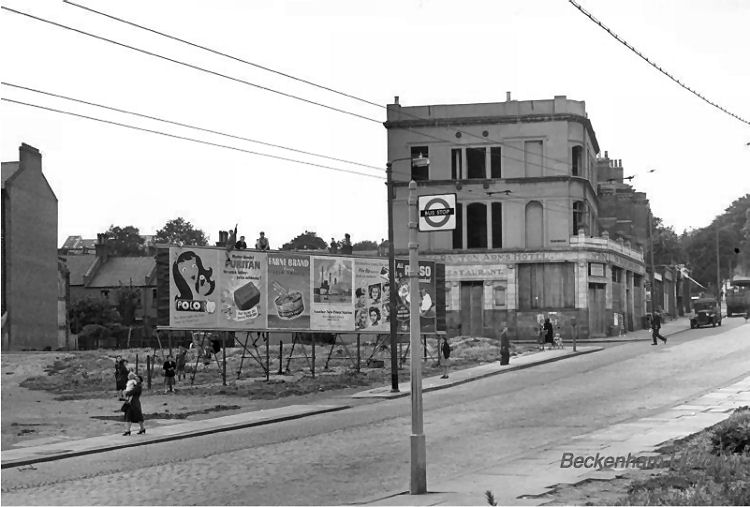
Above photo, 1952, by kind permission of the Beckenham History Society. |
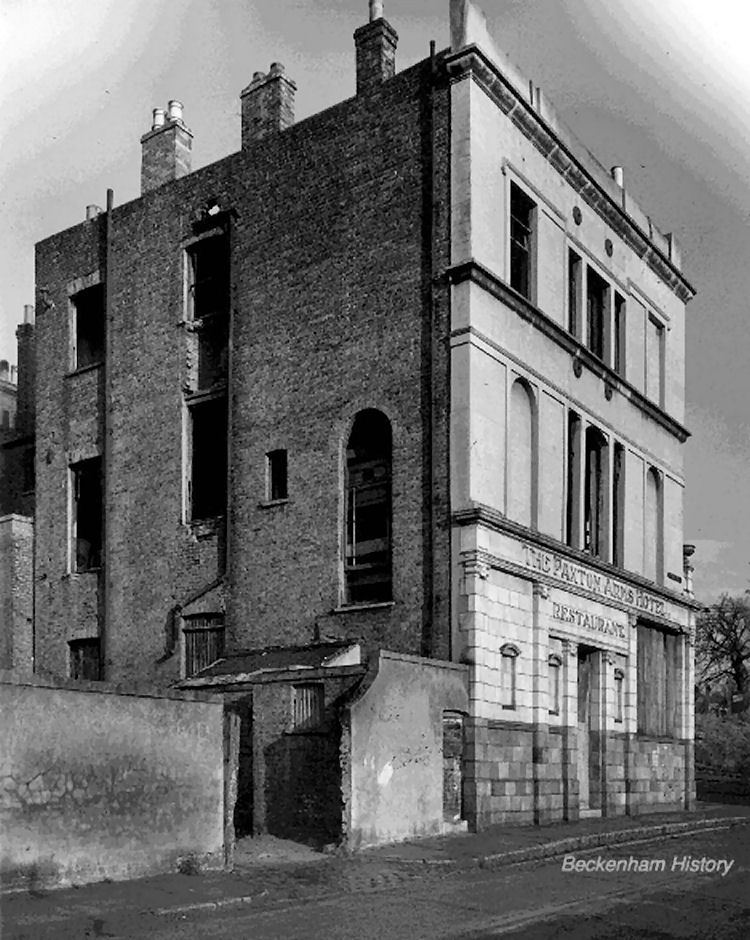
Above photo, November 1953, by kind permission of the Beckenham History Society. |
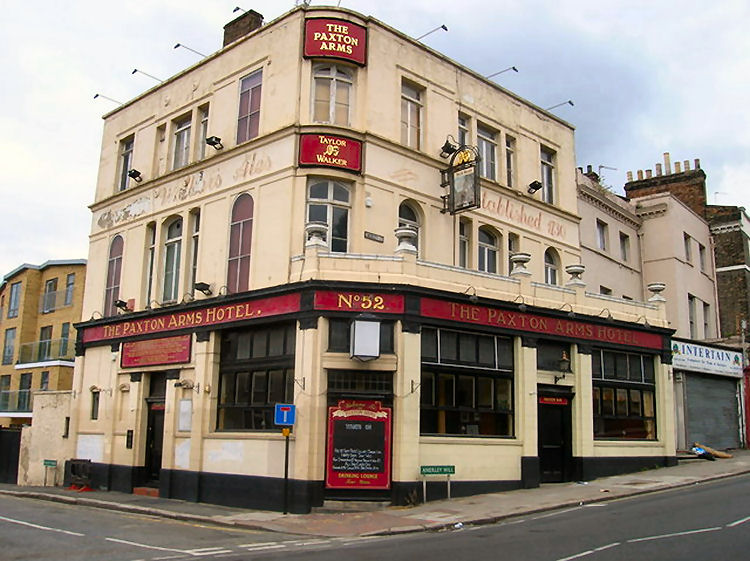
Above photo 2006 by Robin Sones
Creative Commons Licence. |
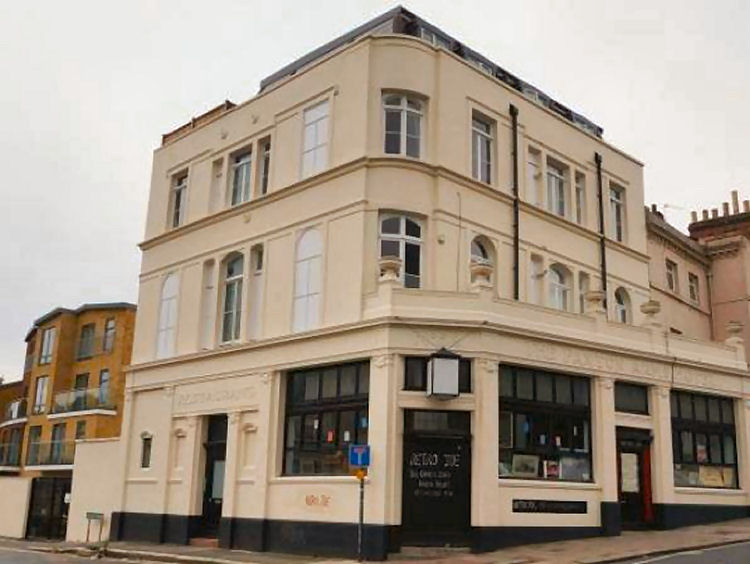
Above photo circa 2013. |

Above photo, 2013, by kind permission of the Beckenham History Society. |
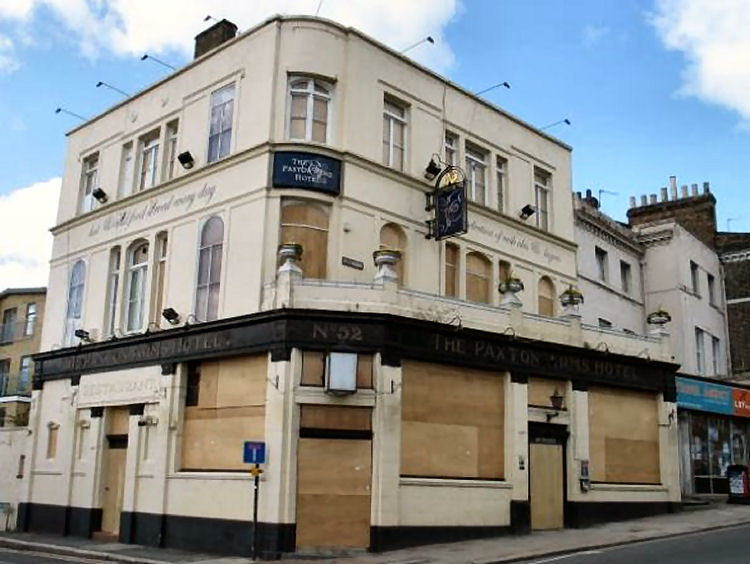
Above photo circa 2018. |
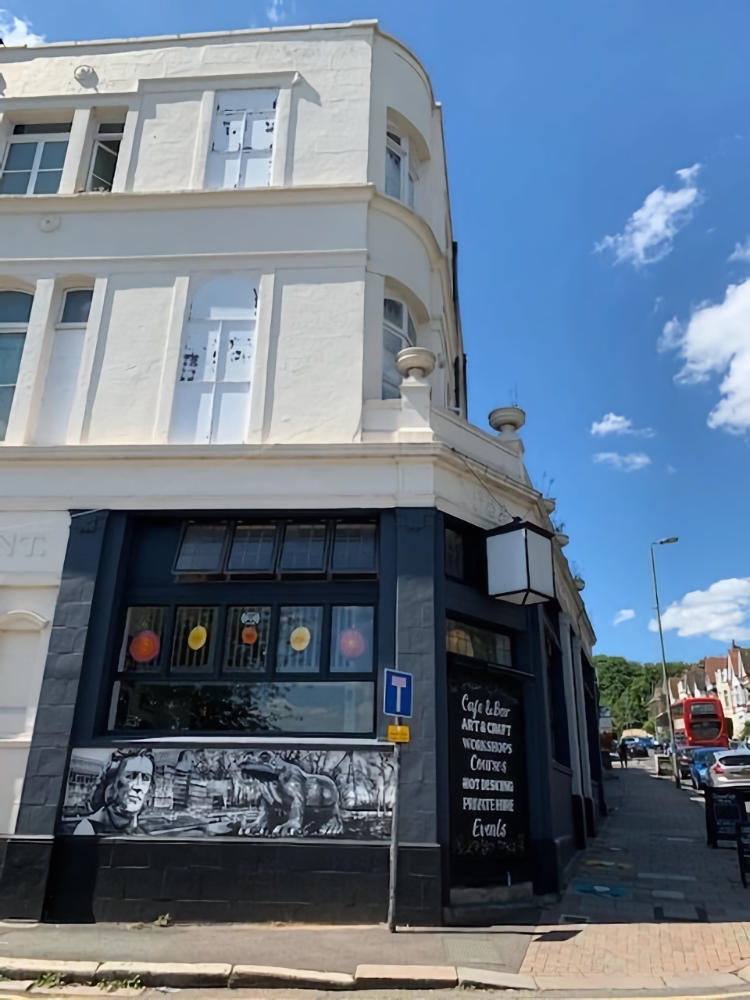
Above photo, 2020. Photo by J Ray-Heard. |
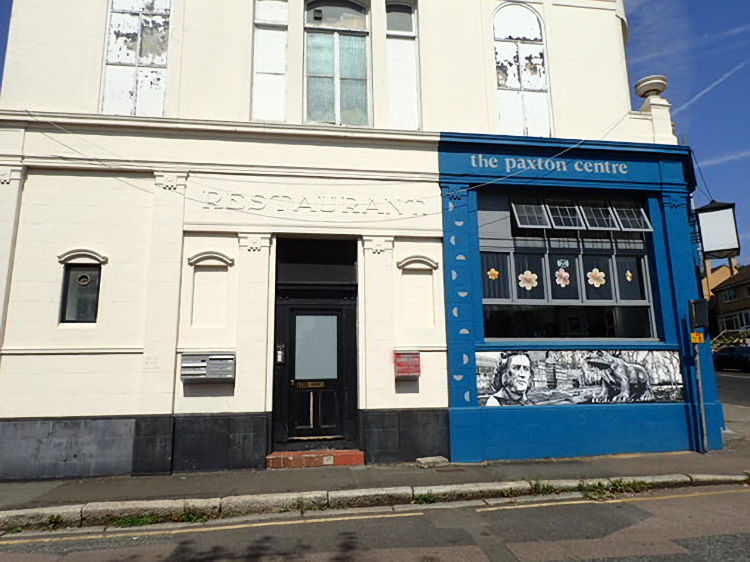
Above photo 2025, kindly sent by John Matthews. |
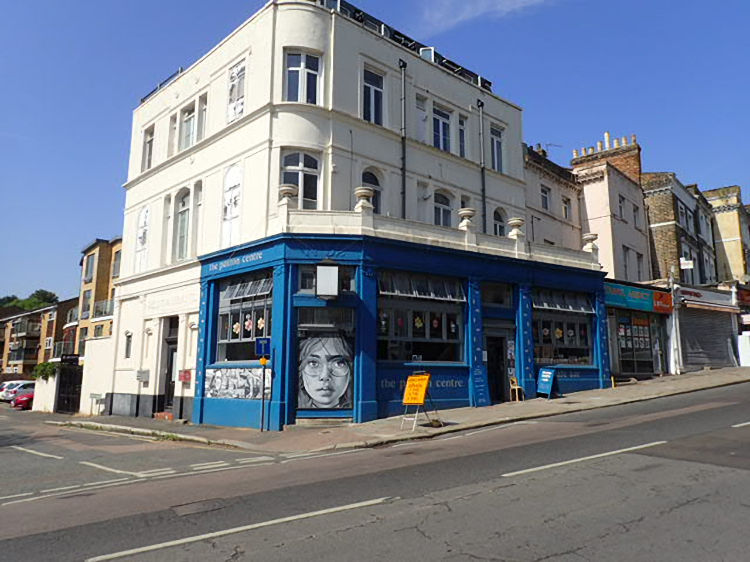
Above photo 2025, kindly sent by John Matthews. |
Palace Road was completely rebuilt in the late 1970’s, the only original
building part of the road is The Paxton Arms Hotel pub, was in existence as
early as 1857. It stands on the corner with Anerley Hill (No 52), opposite
Crystal Palace Station Road, with stabling and a coach house at the rear in
Palace Road.
This pub suffered the impact of German bombing in 1944 and didn’t reopen
until 1955.
|
Sussex Advertiser 27 April 1858.
James Careless v, The Croydon Bench of Magistrates.
This was an appeal against a decision of the Croydon Bench of
Magistrates refusing to grant the appellant a victualler's license.
Mr. Robinson appeared for appellant; Mr. Knipp and Mr Garth for
respondents.
Appellant was for many years landlord of the "Albion Hotel," Epsom, and is
well known for his excellent and spirited catering at the most renowned
race meetings of the country. About three months' since he had taken the
"Paxton Arms," Penge, hitherto kept as a beer shop.
Appellant deposed:– I am assessed at £90 to the poor-rate for the
"Paxton's Arms." I have an agreement for a lease for 21 years. The "Paxton
Arms" cost, I believe, £4000. There are 12 bed rooms. It is far too good
for a beer shop. The "Rising Sun" is 88 yards from my house. The terminus
for the trains from London, Wimbledon, and the West End Railways are
outside the Crystal Palace. On Good Friday I had a great many
applications for spirits. I counted above 100, who went out of my house
on the evening of Good Friday, because they could not get spirits.
Cross-examined by Mr. Knapp:— There are four new dwelling houses built
near my house and occupied. I have not taken the "King's Arms," Croydon. I
have assisted my son to manage the tavern department for Mr. Robinson. I
an a free vintner, but people require spirits as well as wine. The "City
of London Tavern" is nearly 600 yards from my house, the "Star" is 220
yards: Mr. Masters's is 400 yards distant from the same place.
By the Chairman:— I am not to pay any additional rent if I get the
licence.
Mr. Cook, house agent, deposed there were 30 new houses built near the
"Paxton Arms." He thought a license was necessary.
Mr. Phelps, solicitor, Adam Street, Adelphi:— I am solicitor for
appellant. I engaged Mr. Everest, solicitor, Epsom, as my agent, to
conduct the application of Mr. Careless at the Croydon Bench. There were
three magistrates on the Bench, viz., Mr. Byron, Mr. Sutherland, and Mr.
Adams; Mr. Byron was chairman. Mr. Byron said the license ought to be
granted. Mr. Sutherland was passive. - Mr. Adams took an active part in
cross-examining the witnesses for the application. After the case was
gone through some private conversation took place between Mr. Adams and
Mr. Sutherland. The result was the application was refused. Mr. Byron
said, "You know my opinion, I think you ought to have a license." Mr.
Adams is the ground landlord of the wood in which the "City of London
Tavern" is situated. He has let the ground on which it is built to Mr. Thomas Brewer, at £70 a year ground rent.
Edmund Mansell, auctioneer, near the "Paxton Arms," said there could not
be a house better situated for the railway terminus than the "Paxton
Arms."
William Hay, architect and surveyor, deposed:— I know Mr. Adams is ground
landlord of the "City of London Tavern," which was built when it was
supposed that all the persons who went to the Crystal Palace would get
out at the Anerly Station. I think the "Paxton Arms" is the most
conveniently situated house of any for those who come out of the Crystal
Palace for refreshments.
Charles Frederick Ribble, waiter, assisted Mr. Careless on Good Friday
last. Between 300 and 400 came in between one and three on Good Friday;
quite 100 went away because they could not get spirits. People have
taken it for granted that spirits were sold there.
T. Collingwood Kerr, solicitor, said he had seen 40 or 60 people at one
time run across from the railway station to the "Paxton Arms," to get some
spirits, before starting oft back to London by the train.
The follow evidence was then adduced for the respondents:-
Mr. Talbot, stationmaster at the Crystal Palace Railway, examined by Mr.
Knapp, deposed that nine-tenths of those who come down by rail, went
into the Crystal Palace. Not 5 per cent. came out at all. There were
certain rooms building within the Crystal Palace for refreshments and to
supply spirits.
Cross-examined by Mr. Robinson:— Have known spirits sold in the Crystal
Palace for the last 18 months; they have it at a saloon. The Railway and
the Crystal Palace Companies are quite distinct.
The Chairman:— If a person takes a ticket from London to go by rail, and
pays including admission to the Palace, can he go out from the Crystal
Palace Railway Station where he pleases before going into the Crystal
Palace?
Witness:— Yes; but they cannot come out of the Palace and go in again with
the same ticket.
By Mr. Garth:— People with railway tickets will have access to the rooms
now building, but not others.
Mr. Newell, landlord of the "Rising Sun Inn," Penge, deposed that his
trade had very much fallen off. He took £9 less last Good Friday than in
the previous year.
Mr. Westbrook, landlord of the "Star Inn," Penge, deposed that he did less
business now than he did two or three years ago. Did not consider a
license to the "Paxton Arms" necessary. (A laugh.)
Mr. Vivian, landlord of the "Rambler's Rest Inn," Penge, deposed that he
had not sold half the spirits last year that he did the year before.
Cross-examined by Mr. Robinson:— The "Paxton Arms" stands, in a very good
situation.
Mr. Robinson and Mr. Garth having severally addressed the Court, the
Court deliberated about 20 minutes, when the Chairman said -- Under all
the circumstances of the case we are disposed to allow the appeal.
|
|
Morning Advertiser, Monday, 26 July 1858.
GOODWOOD RACES – JAMES CARELESS, King’s Arms Hotel, Croydon
and Paxton Arms, Anerley will, as usual,
SUPPLY REFRESHMENTS in every part of the GRANDSTAND and also the Public Bar
at the back, to those who do not enter the enclosure.
A list of prices will be fixed in every part of the establishment. J.C has
no connection with the booths on the embankment and will be happy to see his
friends at Brighton Grandstand on the 4 August.
|
|
From the Kentish Chronicle, 16 February, 1861.
THE FATAL ACCIDENT on the LONDON and CHATHAM RAILWAY.
On Wednesday morning Mr. William Carter, coroner for the eastern
division of Surrey, opened an inquiry at the "Paxton Arms," near the
Crystal Palace, to investigate the circumstances under which Ellen
Lynch, aged 68, and William Eager, aged 21. came to their death.
The jury having viewed the bodies, the following evidence was given.
Charles Piggott:- I am a general dealer, living at Faversham. I identify
the body of the deceased woman, who was my wife’s sister. She was named
Ellen Lynch, and lived with her son in Wales. I last saw her alive and
in good health on Monday morning at ten minutes past seven, then leaving
her in a railway carriage at Faversham station.
Richard Eager:- I am an engineer, and live in Cavendish-grove,
Wandsworth-road. I knew the man lying dead here. He was 21 years of age,
and my brother, his name was William Eager, and I last saw him alive
five or six weeks ago.
Frederick Austin, a ticket inspector, said:- I am stationed at the
Crystal Palace station. On Monday morning last I was on duty at the
Crystal Palace on the main line or Croydon side, where the Brighton
trains arrive from the Victoria station. The London, Chatham, and Dover
Railway meets at this place, and the passengers change for London
Bridge. About 9.5 that morning I saw a train stop which had come from
Faversham. I saw the deceased female on the platform at the corner by
the ticket office for London. She spoke to me, tendering a Faversham to
Strood ticket, and I told her she would have to pay 2s. on that ticket,
which she paid. She was on the up platform on the Brighton, and had to
cross four sets of rails to get to the London Bridge platform. I did not
notice that she had any luggage. Eager at this time was standing at the
left-hand side of the London Bridge to Victoria down-line. That was just
opposite to where she was. The crossing is a level one; that is, you
have to step over the rails. Eager was in the employ of the London and
Brighton Company as an extra hand. The deceased woman was crossing the
rails, and had got over three sets of them. She had passed Eager, whom I
did not hear say anything or do anything for her assistance. When she
had passed him I saw a train coming from Victoria Station to go to
London Bridge. It was then coming out from the tunnel, which was on my
left. At that time the deceased woman was between the up and down lines
of the Victoria line. There is a space there of 30 feet from the inside
of the up-line of the Victoria. The engine of the train at that time was
about 20 yards from the woman. I called to Eager, and said, "Bill, look
after that woman." He was about 12 or 15 feet from her. I crossed the
line myself with a young gentleman after the train had passed, but did
not know any thing had occurred. I waited for the train to pass; and as
soon as it had passed I saw the two deceased persons lying between the
lines on the London Bridge up-line. They are very much mutilated. One
arm of the woman was smashed, and Eager was very much cut about the legs
and thighs. The bodies were carried into the room at the end of the
platform. The woman was quite dead, and Eager died in a few minutes
afterwards. There is no doubt the engine must have come in contact with
them. I lost sight of Eager as the train passed. The woman did not
appear particularly infirm. I called Eager’s attention to the woman
because I saw the danger as she was half-way across to the up-line. I
consider that Eager lost his life in trying to save the female. He was
there to direct the passengers which way to go. The passengers must of
necessity cross the line to get from one side to the other, except they
should go up the staircase on the arrival platform, through the booking
office, and down another staircase on to the London Bridge platform,
which they could do without crossing the line.
After some further evidence had been taken the coroner summed up, and
the jury returned the following verdict:- "We find that the deceased
persons met with their deaths by accidental causes; but we recommend
that passengers should not be allowed to cross the rails, but that they
should go up the stairs referred to in the evidence, or that such other
accommodation should be provided as will prevent the repetition of such
an occurrence."
Mr. Anscombe, the superintendent, stated that he believed the subject
had already been under the consideration of the company with a view to
adopt the suggestions made by the jury, which would now doubtless be
carried into effect.
The inquiry then terminated.
|
|
Morning Advertiser 4 March 1861.
TRANSFER OF LICENSES.
The "Paxton Arms," Penge from Mr. James Careless to his son of
the same name.
|
|
London Evening Standard, Thursday, 4 April 1861.
CRYSTAL PALACE – Excursionists and Visitors will find the PAXTON ARMS HOTEL,
Anerley, immediately opposite the station and platform.
Cold Luncheons in great variety. Wines, Spirits, Ales, Stout, &c., of the
very best quality at moderate prices. Visitors before entering, or leaving
the Palace will find this a great saving and accommodation – JAMES CARELESS,
Proprietor.
|
|
Norwood News, Saturday, 24 April 1869.
THE PAXTON ARMS.
Opposite the Crystal Palace Station.
Has the best BILLIARD TABLE and the largest and best appointed BILLIARD ROOM
in the neighbourhood. The marker (late of the Crystal Palace Billiard Room),
solicits the patronage of his former customers.
The late lamented accident in the Billiard Room, at the Paxton Arms,
opposite the Crystal Palace Station, by which a well-known gentleman lost
his life.
It appears, from enquiries made of the marker, that a party of gentlemen had
been playing a game of Pool on that splendid table, by Thurston, with
various success, when Mr Simkin and Mr Brown were left with one life each, and
by a clumsy stroke Mr Simkins made a slip with his cue, so losing his life by
an accident.
|
|
Croydon Advertiser and East Surrey Reporter 9 March 1872.
Mr. William Drummond applied on behalf of Mr. Thomas Austin Barnes for a
renewal of the license to the "Paxton Arms," Anerley-road, Penge. He
stated that the house in question had been licensed by the Croydon Bench
thirteen years ago, viz., in 1859; it had been carried on as a
license' house from that time until last year, when no application was
made on licensing day for a renewal of the license, in con-sequence of
the late tenant leaving the house, and the owners not being able to find
a new tenant by licensing day.
The "Paxton Arms" was worth at lest between
£2,000 and £3,000, and was more capacious than the houses in the
immediate neighbourhood, the large room being 37 ft. long by 21 ft.
wide. The Suspensory Act, which had been passed would not in any way
prevent the Bench from renewing the license.
The Chairman read a
report with regard to the applicant, which stated that he had been fined
at the Marylebone Police Court for trading at prescribed hours. The
report also stated that the applicant had been convicted of the same
offence at a public-house he had occupied at St. Pancras, which was
afterwards shut up by the magistrates in consequence.
Mr. Drummond said
all this was not in his instructions.
Mr. Eastty said it would have been
well for Mr. Barnes if he told the whole facts to Mr. Drummond.
|
|
Kentish Mercury, Saturday, 8 September 1877.
PAXTON ARMS,
situate at the corner of ANERLEY ROAD AND PALACE ROAD, UPPER NORWOOD.
With stabling and coach house in the rear and directly opposite the
newly-built Crystal Palace Railway Station, into which thousands of people
pour daily from all parts of London, a great number of whom come out
immediately facing this house.
These premises are massively built of modern construction, having every
accommodation and convenience for carrying out an hotel trade.
Cards to view may be had at of the Auctioneer; and printed particulars had
of Messrs Boulton and Sons, solicitors, 21A Northampton Square, Clerkenwell; at
the place of Sale; and of the Auctioneer, 19 Tooley Street, London Bridge,
S. E.
|
|
Sevenoaks Chronicle and Kentish Advertiser, Friday 30 September 1881.
The Fatal Railway Accident in the Crystal Palace Tunnel.
On Saturday Mr. William Carter held a lengthy enquiry at the "Paxton
Hotel," Anerley Road, Penge, into the circumstances attending the death
of Jonathan Bissex, age 32 years, a platelayer in the employ of the
London, Brighton, and South Coast Railway company, living at 8, Romany
Road, Lower Norwood, who was killed, as well as Joseph Fuller, of 1,
Sidney Cottages, in the tunnel near the Crystal Palace, on Thursday
morning last. Inspector Timmins appeared to watch the case on behalf of
the Commissioner of Police, and Inspector Howland for the Railway
Company.
Richard Turner said he was Inspector of the London, Brighton, and South
Coast Railway Company, stationed at the Crystal Palace. On the 22nd
inst. he was informed that something had happened between Gipsy Hill and
the Palace, and that two men had been killed in the tunnel by a passing
train. Witness went to the signal-box and had the lines blocked each
way. He saw Walter Mitchell and Charles Sharman, and they accompanied
witness into the tunnel between the Crystal Palace and Gipsy Hill
station. They all carried lights, and when they got 250 yards they
discovered Fuller lying between the metals and the wall on the right
side of the tunnel. He was then alive, but unconscious. His injuries
were of such a serious character, as to leave very slight hopes of his
recovering. His left arm and leg were almost severed. He had also
received a scalp wound, and the brain was protruding. He was removed to
Guy's Hospital, but died soon after his admission. Bissex, whom they had
passed unobserved, was lying about 10 yards from Fuller. He was on his
side, his head inclining towards Gipsy Hill. Both men were employed by
his company as platelayers. Bissex was found in the four foot way
dreadfully mutilated. His skull was fractured, and the top was
completely cut off. Witness knew the tunnel to be about half a mile in
length. There were two sets of rails. There were no recesses or "man
holes" in the tunnel.
Charles Sharman, of 14, Victoria cottages, Woodlands Road, Upper
Norwood, said he had been in the service of the company for 29 years. He
met Bissex at 6 o'clock on Thursday morning at Gipsy Hill Station with
two other platelayers, deceased being the ganger. He gave them
instructions go to go to work in the Crystal Palace tunnel. They entered
at Gipsy Hill end, and commence work on the down line from Victoria to
the Crystal Palace. They had naptha lamps, which they shifted about as
they wanted. They were all perfectly sober, and after breakfast they
again entered into the tunnel for the purpose of lifting some "joints"
on the road. About 2 hours after they have resumed work witness noticed
a goods train enter the tunnel from the Crystal Palace end. As witness
was standing against the wall looking at the goods train they all became
enveloped in steam and smoke, and as it passed witness, he felt a man
thrown against his legs. That was the first intimation he had of a
second train being in the tunnel. Witness soon after found that it was a
passenger train from Willesden Junction to New and South Croydon, due at
the Crystal Palace station at 10:32 p.m. It was a London and North
Western train. Witness could not say what rate it was going. He could
not hear its approach on account of the noise from the goods train.
After the train had passed away they were left in total darkness, the
lamps having been extinguished by the engine of the passenger train.
Witness was of opinion that the driver of the passenger train could not
see them. he did not hear any whistle sounded by the passenger train. It
was usual for the drivers to sound the whistle at either end of the
tunnel. The goods train was a very heavy one on account of its having
two engines. If the whistle had been sounded witness was of the opinion
that he should not have heard it owing to the noise caused by the puffs
of the engine and the rattling of the trucks. As soon as the trains had
passed witness he stooped down and felt a man by his feet. As soon as
the trains had passed witness he stooped down and felt a man at his
feet. He took hold of him and said, "Who are you!" He received no
answer, and soon after he came across the other man, and he received no
reply from him. Witness then had to grope his way out of the tunnel in
the dark, when he saw Walter Mitchell with a light in his hand. They
then went to the signal-box and gave information to the signalman. He
then went back with Mitchell, when they found deceased. They removed him
on one side. A few yards further on they discovered Fuller alive, but
unconscious. When two trains passed through the tunnel simultaneously,
as upon this occasion, the men engaged in repairing the metals had to
lie down at full length in the 6-foot way or between the near rail and
the wall, as there was no other means providing for their safety. In
witnesses' opinion, the accident was unpreventable as far as the driver
was concerned. Had there been any recesses in the tunnel he could not
say, under the circumstances, whether he or the deceased man would have
got into them.
In answer to a juryman, witness said there were no air shafts in the
tunnel. Witness had worked in the tunnel for the past 20 years, and he
was not aware that any instructions were given by the company for the
men at work in the tunnel to lie down on the approach of a train. This
was the first accident that occurred in the tunnel for 20 years. When
witness first worked in the tunnel it had two air shafts; they had since
been filled in.
Walter Mitchell, another platelayer, who was at work in the tunnel at
the time, was called but not sworn, and, in answer to the coroner, said
he was some distance away from the other men at the time of the
occurrence. He saw the goods train into the tunnel, which was soon
enveloped in steam and smoke.
The jurymen thought it unadvisable to examine Mitchell. After three
quarters of an hour's deliberation the jury returned a verdict of
accidental death, adding the following rider:- "That the tunnel in
question was highly dangerous to the men working in it, and to prevent
further loss of life (the jury) would suggest that an air shaft should
be provided; also that man-holes should be made, so as to enable the men
to get out in safety instead of lying down on the ballast, thereby
exposing themselves to be scalded to death; and also, while the line was
under repair, the drivers should be instructed to slacken speed whilst
passing through the tunnel.
|
|
Norwood Essex Herald – Saturday, 1 August 1885.
WANTED, immediately, a Good GENERAL SERVANT who can do good plain cooking,
for the Paxton Arms, Anerley Road, Upper Norwood, Surrey.
|
|
Sporting Life, Monday, 6 October 1902.
PAXTON ARMS HOTEL, ANERLEY HILL.
GRAND BILLIARD MATCH
BERT HAWKES v J WITHERS
750 np Withers with 150 start
THURSDAY, October 9 Commencing at 7.0p.m
PAXTON ARMS HOTEL, ANERLEY HILL
Proprietor, T. G. Wernham |
I have also seen this pub addressed as in both Crystal Palace and
Anerley.
In 1870, the pub was For Sale by Auction on 25 July that year.
The pub was closed in 1944 after being hit by a flying bomb and wasn't
opened again until 1955. The licensees moving to and running the "Hole in
the Wall," Old Kent Road. On the wall today there is a plaque giving
information of this and it also says that one of the rescuers was invited to
have the first drink there when it reopened.
It closed as a pub in 2013 and planning consent was given in August of
that year for the conversion into 3 one bedroom and 4 two bedroom flats,
whilst the ground floor will be used for retail use, however it is now used
as the Paxton Centre Community Arts Space.
|
From the
https://www.newsshopper.co.uk By Helen Corbett, 6th June 2016.
'It's all I have of my family history': Mum furious after pub memorial
to grandad John Markham who rescued survivors of WW2 Crystal Palace bombing is painted over.
A Forest Hill mum is fuming after a plaque commemorating her
grandfather’s efforts when a second world war bomb fell was painted over
during a refurb of the Crystal Palace pub where it was fixed to the
wall.
The sign had been in pride of place on the outside wall of the Paxton
Arms Hotel for decades and recalled the story of a World War Two bombing
which destroyed the pub.
The sign read: “It was the summer of 1944 when one of Germany’s VI
flying bombs landed about halfway down Anerley Hill and put the Paxton
Arms out of business.
“At the time, a young man, John Markham, was enjoying a drink.
“He finished his pint and helped rescue survivors from nearby houses.
“Eleven years later, on 28th December, 1955, Mr Markham was the first to
enjoy a drink when the pub reopened after being extensively rebuilt by
Taylor Walker.”
A few weeks ago, John Markham’s granddaughter Laura Markham, 29, walked
past the pub and saw that the sign was gone.
She told News Shopper: “It’s changed into a tea room from a pub.
“They boarded up all the windows and the sign and I did go in and ask
what had happened and I was reassured it was going to be there.
“They’ve painted over the sign and put a menu up.
“It’s called Retro Joe’s now – but they’ve got rid of the sign, and
that’s the retro bit.”
Bromley Council has no official record of the John Markham memorial and
from a legal standpoint, it is at the owner’s discretion whether they
maintain and keep any plaque or memorial sign put up on its walls.
Emma Simpson, who runs Retro Joe’s with her husband, said the sign was
painted over last summer by builders.
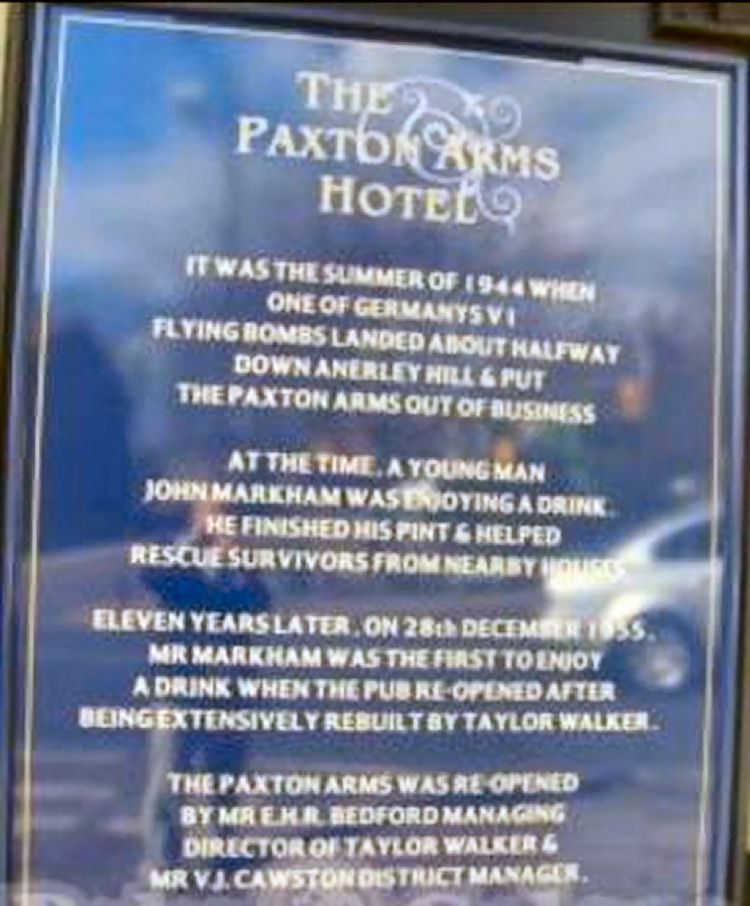
The last memory Laura has of the sign - a blurry photograph.
She said: “It wasn’t actually us that painted over the sign – it was
during building work that it was painted over and they plastered over
original shrapnel damage too which we weren’t pleased about.
“It is not a listed building so we don’t have to keep the sign but we
think it is important to the history and we want to replace the sign
with a memorial that includes all of the people who died in that bomb
strike.
“I did put up a replacement sign out front but people kept stealing it –
I don’t know why.
“We have tried. There is a memorial to the people affected by the other
bomb that hit the area but not here.”
Laura’s dad is now 74 and as her grandparents died when she and her
34-year-old brother James were very young, the story is one of the only
things she has to remember her grandad by.
But she also sees it as a vital piece of the past that chronicles the
story of Crystal Palace itself.
She said: “That’s all the family we have got on my dad’s side.
“This is all I have got of my family history.
“I’ve got a little boy now and I have taken him and read the story to
him.
“When it was the Paxton Arms, my grandad drank there, my dad drank there
and my brother drank there – it linked three generations.
“I just want there to be something there still marking what happened.
“Crystal Palace history is coming alive now with the subway reopening –
and this is part of that history.
“I just want something back.”
![Paxton Arms original ]war damage sign](../2023-Photos2/Paxton-Arms-war-sign-Penge.jpg)
Above photo showing the original sign.
|
LICENSEE LIST
CARELESS James Nov/1858-Mar/1861
CARELESS James jun. Mar/1861+ (age 43 in 1861 ) )
SALMON Mary Ann 1874-75+
FENNING R F 1878+
CRUWYS John 1880+
ROBERTS Mary A Roberts 1881+ (widow age 37 in 1881 ) )
DAVIDSON John 1891+
LAKE Emma 1891+ (widow age 42 in 1891 ) )
GRAHAM Alexander 1894-96+
WERNHAM Thomas G 1901+ (age 30 in 1901 ) )
WENHAM Thomas 1903+
WENHAM Fanny Mrs 1908-18+
BLACK Mabel Mrs 1922+
LOCKTON Frank 1927+
LABERL Joseph & Ruby to 1944
https://pubwiki.co.uk/PaxtonArms.shtml
https://www.closedpubs.co.uk/paxtonarms.html
 Census Census
|











![Paxton Arms original ]war damage sign](../2023-Photos2/Paxton-Arms-war-sign-Penge.jpg)